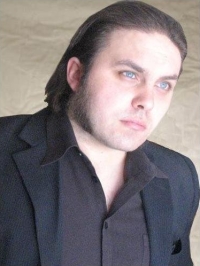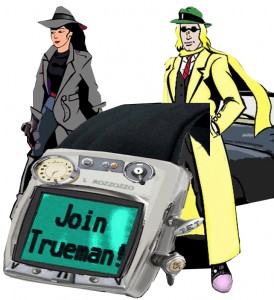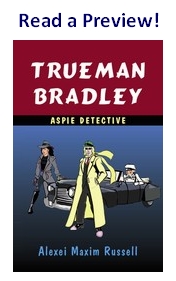 In addition to writing fiction, non-fiction, poetry, screenplays, Alexei Maxim Russell is an advocate for building awareness concerning Autism and Asperger’s Syndrome (AS). It is his interest in AS that inspired him to create Trueman Bradley, a positive role model and literary hero for those with AS.
In addition to writing fiction, non-fiction, poetry, screenplays, Alexei Maxim Russell is an advocate for building awareness concerning Autism and Asperger’s Syndrome (AS). It is his interest in AS that inspired him to create Trueman Bradley, a positive role model and literary hero for those with AS.
Here, he talks about the important lessons underlying his new novel, Trueman Bradley – Aspie Detective – published this month by Jessica Kingsley Publishers.
What motivated you to write this novel?
Having watched my AS-diagnosed younger brother grow up, I had an intimate view into the AS mind that few others possess. I came to realize, the reason so few people seemed to understand AS is because they had not benefited from the kind of first-hand acquaintance with AS, which I had with my brother. Only the parents of AS children, and people like me who are close family members, can truly understand what this teaches you. Unfortunately, when you do gain this understanding, it becomes all the more evident how little the rest of the world understands AS. The lack of understanding I would see my brother encounter and even the occasional prejudice, would often dismay me, sometimes anger me, and made me worry for my brother. I channeled all these feelings into writing this novel.
I saw the challenges the AS mind has in assimilating with a society that still does not understand how it thinks. But I also discovered, often with wonder, what incredible potentials the AS mind contains. In many ways, the AS mind is more competent at certain things than the rest of us are. The irony of hearing AS referred to as a “disability” began to form in my mind. As my brother grew up, I began to glean a secret that society, it seemed, had not yet discovered. AS, when understood by the rest of us, is not a disability. Far from it, it becomes a gift. We are, in fact, the problem. Because it is only our lack of understanding of the AS mind that holds back its potential.
 This was a kind of cathartic realization for me. And I wanted to relay these things I’d seen and learned.
This was a kind of cathartic realization for me. And I wanted to relay these things I’d seen and learned.
Being a novelist, I naturally chose fiction as my tool for accomplishing this. I knew if the story line was entertaining enough, if the characters were believable enough and my message subtle enough, that people would read what I had to teach them right to the end, maybe even unaware of the fact they were learning a lesson.
I also wanted to provide an AS protagonist, as it seems to me there are few of them out there in the world of literature. I thought, “If the rest of us can have our literary heroes, our Sherlock Holmes and our Philip Marlowes, then why can’t AS people also have a literary detective hero?” I believe Trueman Bradley has evolved into a large enough personality to effectively fill that void. I look forward to seeing more AS heroes popping up, in literature.
Who have you written this novel for, who do you hope will read it?
It was not my conscious intention to write it for children, specifically. But it is very suitable for children. I think people have had the impression it is destined for the young adult shelves because I took care to avoid using idioms and expressions and implied social language which some people with AS are not comfortable with and sometimes can’t understand. I have a friend, who is self-diagnosed AS, and who edited the book, chapter-for-chapter, as I wrote it. She did a very good job of assuring that I didn’t use any thick, colloquial language which may have made the novel hard for some people with AS to read. I wanted all types of people to benefit from the book and, due in part to the excellent work of this editor, I think we succeeded in accomplishing this.
 The language of the novel is very clear and simple. This is a style which is also commonly used in young adult fiction. This, in my opinion, is why the book is regarded as being for a younger crowd. That and the fact that it has no particularly offensive content and therefore could be called “family friendly.” But at the same time, adult readers are fascinated by the integration of mathematics, art and the stylistic insertion of a very “comic book” feel in a format which is complex enough to stimulate the intellect and imagination of the adult mind. In this way, I think I accomplished my goal of writing a novel that can appeal to almost anyone, regardless of age or reading level.
The language of the novel is very clear and simple. This is a style which is also commonly used in young adult fiction. This, in my opinion, is why the book is regarded as being for a younger crowd. That and the fact that it has no particularly offensive content and therefore could be called “family friendly.” But at the same time, adult readers are fascinated by the integration of mathematics, art and the stylistic insertion of a very “comic book” feel in a format which is complex enough to stimulate the intellect and imagination of the adult mind. In this way, I think I accomplished my goal of writing a novel that can appeal to almost anyone, regardless of age or reading level.
First and foremost, I wrote the novel for my brother. I wanted to accomplish two things that would make the world a safer place for him and everyone with AS. Firstly, to educate those without AS; I consider the novel to be the most basic of possible education on the subject. Secondly, I wanted to give people with AS something. I wanted to provide a verification of what many of them already know. I wanted to give them a voice and a hero which would contradict those who are always telling them they are “disabled”. I wanted to tell them that AS is not a disability, it is a different way of thinking. And in spite of what others may be telling them, it is not a “wrong” way of thinking.
What kind of response have you gotten, so far?
I have gotten mostly positive reviews, thus far. This is, I understand, uncommon in literature so I am very pleased it seems to be resonating with readers. My most positive reviews have been from educators and consultants. This brought me unspeakable levels of satisfaction, to know my depiction of Trueman was accurate enough to get a passing grade from the educational and consulting establishments. This is especially gratifying, because I was, first and foremost, seeking to educate. And so, validation from educators is very valuable to me.
What do you plan to do now that the book is published?
I have many other writing projects I am keen to finish, but I would like to make it a priority to continue writing Trueman Bradley books. As, there are a great many more subtle issues concerning AS and Autism which sorely need addressing and recognition by the public at large. In some ways, the first book scratches the surface. I, for one, am usually not satisfied with only a basic education. I’m sure my readers would not be either. Trueman is still young and is only beginning his detective career. The world is just beginning to understand AS and is only starting to educate itself on the issues surrounding it. I have no doubt both Trueman and the world have a lot of future life lessons to look forward to.
Copyright © Jessica Kingsley Publishers 2011.